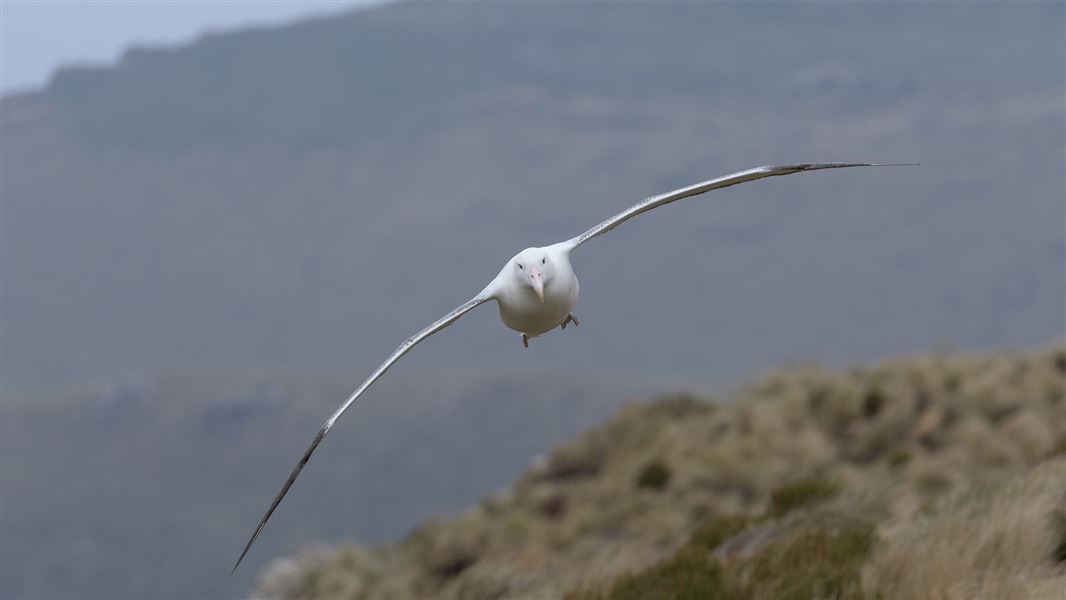Archived content: This media release was accurate on the date of publication.
Date: 01 December 2023
The Seabird-Safe Fishing Toolkit responds to increasing demand for sustainable seafood by supporting the tuna longline fishing industry to implement measures to reduce seabird bycatch.
The Department of Conservation and the Southern Seabirds Trust presented the toolkit project this week to an APEC roundtable of representatives from governments, industry, NGOs and academia from ten APEC economies.
“This project signals a new approach to bycatch mitigation because we’re engaging directly with the industry – those who are having the highest impact on our birds,” DOC’s International Manager Danica Stent says.
“The toolkit will support companies and fleet managers to achieve their objectives for seabird bycatch management. Although it doesn’t promote new regulations or standards, it will present information on bycatch mitigation in a way that is practical and accessible.”
The toolkit will bring together essential information about the ocean areas important to threatened seabirds, the best measures to avoid bycatch of seabirds, and robust monitoring methods.
International seafood industry and sustainability giants Thai Union, Tri Marine and Seafood Business for Ocean Stewardship (SeaBOS) joined the event expressing their support for the toolkit and how it can help reverse seabird population declines while at the same time delivering benefits to industry.
Danica Stent says the biggest threat for many seabirds, including albatrosses, petrels and shearwaters, is bycatch in tuna longline fisheries on the high seas, outside New Zealand.
“This threat is driving decline of many species, and some of our most critically threatened species may become extinct in our lifetimes if we do not address the problem.
“New Zealand is home to more breeding seabirds than anywhere else in the world, many of which are taonga to Māori and 90% are in trouble.”
In a global seabird bycatch assessment funded by the Food and Agricultural Organization of the United Nations’ Sustainable Management of Tuna Fisheries, it was estimated that 30,000-40,000 seabirds are being caught every year in the southern hemisphere.
Danica Stent says the bycatch problem can be solved if longline vessels use simple and cost-effective tools that make fishing “seabird safe”.
“Solutions to the bycatch problem include bird scaring lines to scare birds away from baited hooks, weighting hooks so they sink quickly away from diving birds and setting hooks at night.
“This forum gives us access to fishing economies with fleets that have a high overlap with our vulnerable seabirds, including Japan, People’s Republic of China, and Chinese Taipei.”
Development of the Seabird Safe Fishing Toolkit is being supported by the Asia Pacific Economic Cooperation (APEC) Ocean and Fisheries Working Group (OFWG).
Five APEC economies co-sponsored the roundtable to discuss the toolkit: Chile, Chinese Taipei, People's Republic of China, Peru, and the United States.
The toolkit will be developed over 2024 and presented to the APEC Oceans and Fisheries Working Group in August 2024.
Background information
- Thirty-one percent of all seabirds are listed as threatened by IUCN. Satellite tracking seabirds shows they face the highest threats in the high seas’ areas.
- Compared to other nations, New Zealand has the greatest number and diversity of seabird species, 90% of which are threatened or at risk of extinction.
- The toolkit project is being developed by the APEC (Association Ocean and Fisheries Working Group (OFWG). The project was initially presented to the OFWG in late July 2023, and was well received.
- Development of the Seabird Safe Fishing Toolkit is funded by the New Zealand Nature Fund, Live Ocean, and a US philanthropist, and led by Southern Seabirds Trust, in partnership with the Department of Conservation.
- The Southern Seabirds Trust is a non-profit organisation whose partners are the New Zealand Government (Department of Conservation, Fisheries New Zealand, Ministry of Foreign Affairs and Trade), Seafood New Zealand, Te Ohu Kai Moana and WWF-New Zealand. The Trust works collaboratively with fishers and fishing companies to protect seabirds.
Contact
For media enquiries contact:
Email: media@doc.govt.nz
